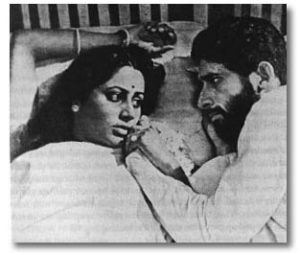Born in 1955 in Pune, Smita Patil entered the film industry after a brief stint as a television announcer. Her first major role as the woman who leads a Harijan revolt in Shyam Benegal’s Manthan (The Churning) won her critical acclaim. Exceptional performances such as the outspoken tribal in Ketan Mehta’s Bhavni Bhavai and as the struggling actress, Hansa Wadkar, in Benegal’s Bhumika (The Role) established her reputation as a versatile actress both in India and abroad. In what was a unusual honor for an actress who was then less than 30 years of age, and had been working in the cinema for less than 10 years, her work was celebrated at the festival of La Rochelle and by the French cinematheque in 1984. Alongside Shabhana Azmi, Naseeruddin Shah, and Om Puri, Smita Patil was to be an integral part of the New Indian cinema, and she was to feature in a very large number of films which offered some glimpse of the life of the working-class and marginalized in India. Smita Patil, who was also an activist and a member of the Women’s Centre in Bombay, was deeply committed to the advancement of women’s issues, and gave her endorsement to films which sought to explore the role of women in traditional Indian society, their sexuality, and the changes facing the middle-class woman in an urban milieu. In Jabbar Patel’s Marathi film Umbartha (1982), Patil played the superintendent of a women’s prison who finds the courage to leave her husband after he casually admits to having had adulterous affairs. One of her most memorable feminist roles may have been in Ketan Mehta’s Mirch Masala (1985), where she plays a village woman, Sonbai, who is much desired by the feudal master. Cornered in a chili factory by his men, she extricates herself from a most difficult situation by throwing chili powder into his eyes.
Smita Patil was a woman of exceptionally striking beauty, though scarcely of the type that predominates in the commercial cinema, and she displayed an equally extraordinary maturity in every performance she ever gave. Though she was to appear in some commerical releases, she was clearly out of place in those roles. Her career was tragically cut short by her death in 1986 during childbirth, as if in ominous reminder of the precariousness of the lives of women in India. Her talent as a photographer has only been recently discovered after the 1992 exhibition of her photographs, Through the eyes of Smita, at the National Centre for the Performing Arts, Bombay.
Sources
Vasudev, Aruna. The New Indian Cinema. New Delhi: Macmillan, 1986
Rajadhyaksha, Ashish; Willemen, Paul. Encyclopedia of Indian Cinema. London: British Film Institute; New Delhi: Oxford University Press, 1994
Kishore, Valicha. The Moving Image. Hyderabad: Orient Longman, 1988
Brief Filmography
Nishant (1975)
Manthan, Bhumika (1976)
Bhavni Bhavai, Akaler Sandhaney (1980)
Albert Pinto Ko Gussa Kyon Aata Hai (1980)
Arth (1980)


